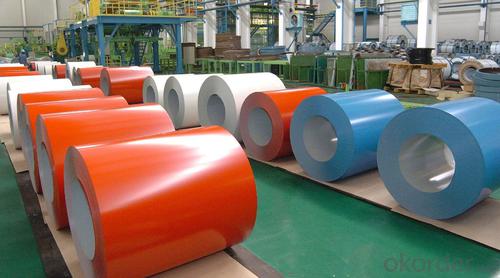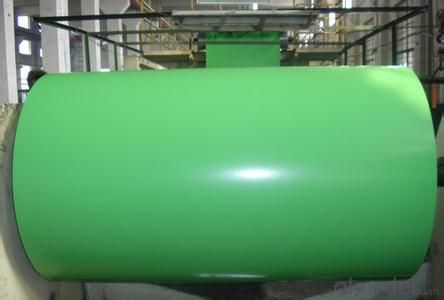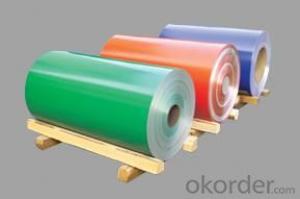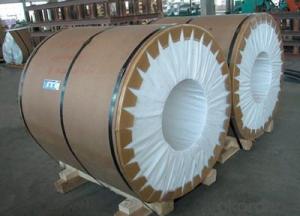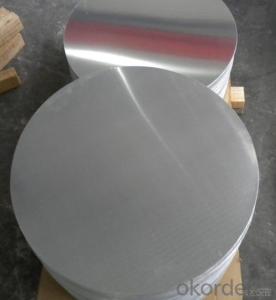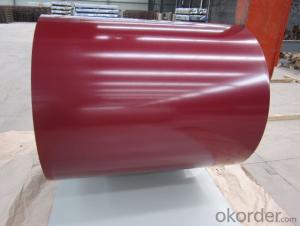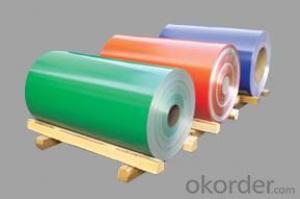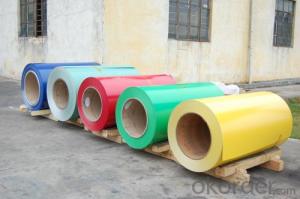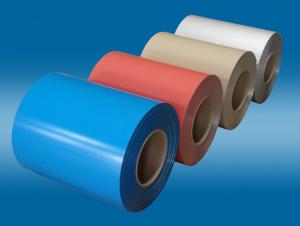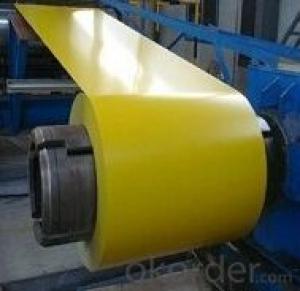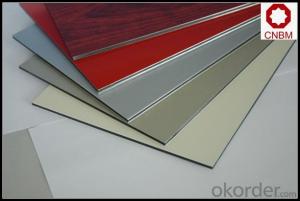Prepainted Aluminum Coil Price - Colored Coated Aluminum Coils
- Loading Port:
- China Main Port
- Payment Terms:
- TT or LC
- Min Order Qty:
- 5 m.t.
- Supply Capability:
- 10000 m.t./month
OKorder Service Pledge
OKorder Financial Service
You Might Also Like
1.Structure of Aluminum Coils Colored Coated Description
Aluminum coils color coated are of a wide range of colors, which give wonderful appearance no matter in residential and commercial constructions or great exhibition centers.
Aluminum coils color coated have been widely used in the fields of construction and decoration, electronic applications, lighting decoration, air-condition air pipes, sandwich panels and drainages etc.
2.Main Features of the Aluminum Coils Colored Coated
• Superior quality of raw material
• Reasonable and stable chemical composition
• Accurate tolerance
• Goode mechanical property
3.Aluminum Coils Colored Coated Images
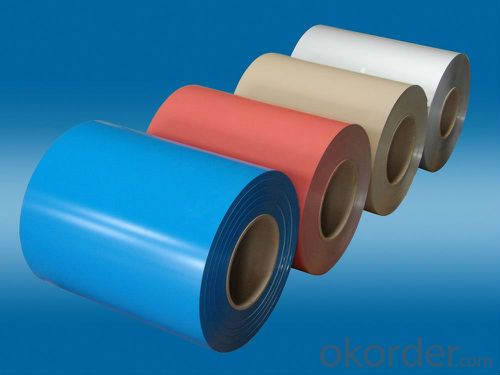
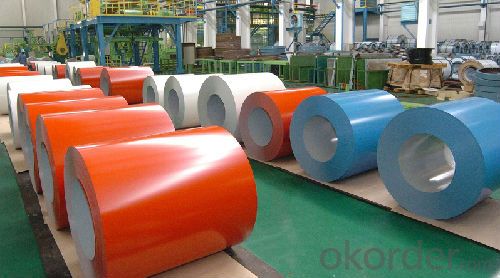
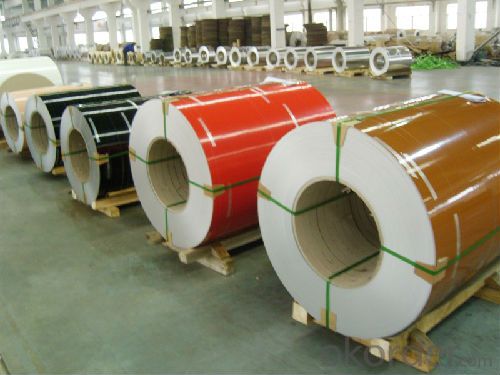
4.Aluminum Coils Colored Coated Specification
| Alloy | AA1xxx,AA3xxx,AA5xxx |
| Temper | H14,H16,H18,H22,H24,H26,H32,O/F |
| Thickness | 0.03mm-3.0mm |
| Width | 30mm-1700mm |
| Coating | PE,PVDF,Epoxy |
| Painting Thickness | Standard 16-25 Mic, max 40 Mic |
| Color | According to RAL colors or customers' samples |
| Standard | GB/T 17748-1999 |
5. FAQ of Aluminum Coils Colored Coated
A.How to guarantee the quality?
Customers are welcome to our mill to visit and check the products. Besides, we can arrange a third party to test theAluminum Coils Colored Coated products.
B.When will you deliver the products?
The Aluminum Coils Colored Coated will be delivered within 35 days after receiving advanced payment or original L/C.
- Q: What role does the powdered aluminum play in this reaction?
- Aluminum is what burns or combines with oxygen. Learn How, you have it backwards. Iron oxide is the oxidizer.
- Q: This question asks for methods to check if an aluminum coil has been damaged during the transportation process.
- <p>To determine if an aluminum coil is damaged during transportation, inspect it visually for any dents, scratches, or deformations. Check for any signs of rust or corrosion, which could indicate exposure to moisture. Ensure the coil is clean and free from any foreign materials that might have adhered during transit. Use a magnetic particle inspection or dye penetrant testing for more detailed internal and surface inspections, especially if the damage is not visible. Additionally, measure the coil's dimensions to ensure they are within the specified tolerances. If the coil is part of a shipment, also review the transportation records for any incidents that might have caused damage.</p>
- Q: What are the advantages of using aluminum coils over other materials?
- Some advantages of using aluminum coils over other materials include its lightweight nature, excellent thermal conductivity, corrosion resistance, and ease of fabrication. Additionally, aluminum coils offer good electrical conductivity, making them suitable for various applications in industries like automotive, construction, and aerospace.
- Q: Do aluminum coils require any special maintenance?
- Yes, aluminum coils do require special maintenance. Regular cleaning and inspection are necessary to ensure their optimal performance. This includes removing any debris or dirt buildup, checking for any signs of corrosion, and ensuring proper airflow around the coils. Additionally, it is important to follow manufacturer's recommendations for maintenance to prolong the lifespan of the coils.
- Q: What are the pros and cons of utilizing aluminum coils in storage applications?
- <p>Aluminum coils offer several advantages for storage, including high durability, corrosion resistance, and lightweight properties which make them easy to handle. They are also recyclable and have good thermal conductivity, which can be beneficial in temperature-controlled environments. However, there are downsides such as higher initial costs compared to some other materials and potential for denting or damage if not properly handled. Additionally, while aluminum is generally non-magnetic, it can be attracted to strong magnets, which might be a consideration in certain storage scenarios.</p>
- Q: Please tell me the model of antirust aluminium coil, it is better to have a detailed introduction. Thank you。 Shandong production of rust resistant aluminum coil manufacturers
- We are Ji'nan excellent Aluminum Co., Ltd., anti rust aluminum roll, now domestic generally use 3003 material, the price is now 19500 yuan / ton.3003 aluminum coil for AL-Mn alloy, is the most widely used of a rust resistant aluminum, density is 2.73. Suitable for pipeline insulation and other heat preservation projects, can be used in the outer packing, mechanical components, refrigerators, air conditioning, ventilation pipes and other humid environment.
- Q: Can aluminum coils be used in food processing or packaging?
- Yes, aluminum coils can be used in food processing or packaging. Aluminum is widely used in the food industry due to its excellent properties such as being lightweight, non-toxic, and resistant to corrosion. These properties make it an ideal material for food processing and packaging applications. Aluminum coils can be used to make various food packaging products such as cans, lids, foils, and trays. They provide a barrier against oxygen, moisture, and light, which helps to preserve the freshness and quality of food products. Additionally, aluminum coils are easy to shape, form, and seal, allowing for efficient and effective packaging solutions. Overall, aluminum coils are a popular choice for food processing and packaging due to their versatility, durability, and safety.
- Q: What are the various applications and purposes of aluminum coil in different industries?
- <p>Aluminum coil is widely used in numerous applications due to its lightweight, corrosion resistance, and high strength. It is commonly used in construction for roofing and siding, in the automotive industry for body panels and heat exchangers, and in the packaging industry for food and beverage cans. Aluminum coil is also utilized in electrical applications such as transformers and wiring, and in the manufacturing of everyday items like foil and cookware. Its versatility makes it a popular material in various industries.</p>
- Q: This is for handling aluminum
- Aluminum as a solid is very safe; although non-nutritious (your body does not require it), its accumulation in tissues is apparently not directly harmful. Individuals who work years of their lives in handling aluminum have no higher incidence of Alzheimer's disease than those that do not. As a powder- particularly very fine powders- aluminum is extremely hazardous with respect to its combustibility, and is used in fireworks (sparklers, for example). When it burns, it is extremely hot, and extinguishing it should not be attempted without training and the correct tools- usually salt or Purple K extinguishing agent. However, it burns so quickly that it will usually be out before attempts can be made.
- Q: How can you tell the difference between aluminum and other non-magnetic metals, such as what I've heard called, pot-metal?
- Aluminum is very light. Pot metal, also known as white metal, die-cast zinc, or monkey metal,[1] is a slang term that refers to alloys that consist of inexpensive, low-melting point metals used to make fast, inexpensive castings. There is no scientific metallurgical standard for pot metal; common metals in pot metal include zinc, lead, copper, tin, magnesium, aluminium, iron, and cadmium. The primary advantage of pot metal is that it is quick and easy to cast. Due to its low melting temperature no sophisticated foundry equipment is needed and specialized molds are not necessary. It is sometimes used to experiment with molds and ideas before using metals of higher quality. Examples of items created from pot metal include toys, furniture fittings, tool parts, electronics components, and automotive parts.[citation needed] Pot metal can be prone to instability over time, as it has a tendency to bend, distort, crack, shatter, and pit with age.[1] The low boiling point of zinc and the fast cooling of the newly-cast part often allow air bubbles to remain within the cast part, weakening the metal.[1] Many of the components of pot metal are susceptible to corrosion from airborne acids and other contaminants, and the internal corrosion of the metal often causes the decorative plating to flake off.[citation needed] Pot metal is not easily glued, soldered or welded.[1] At one time, pot metal referred to a copper alloy that was primarily alloyed with lead. 67% Cu, 29% Pb 4% Sb and 80% Cu, 20% Pb were common formulations.[2] The primary component of pot metal is zinc, but often the caster adds other metals to the mix to strengthen the cast part, improve the flow of the molten metal, or to reduce cost.[dubious – discuss] With a low melting point of 419 °C (786 °F), zinc is often alloyed with other metals including lead, tin, aluminium and copper.
Send your message to us
Prepainted Aluminum Coil Price - Colored Coated Aluminum Coils
- Loading Port:
- China Main Port
- Payment Terms:
- TT or LC
- Min Order Qty:
- 5 m.t.
- Supply Capability:
- 10000 m.t./month
OKorder Service Pledge
OKorder Financial Service
Similar products
Hot products
Hot Searches
Related keywords



